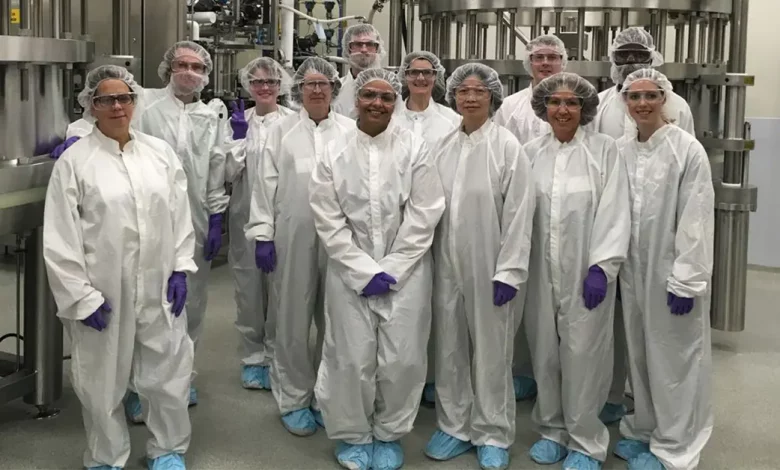Daily Current Affairs for UPSC
Bio-manufacturing and bio-foundry
Syllabus: Science and Technology[GS Paper-3]

Context: In the Interim Budget 2024-25, the Finance Minister of India presented a plan for the establishment of bio-manufacturing and bio-foundry.
Details:
- This plan aims to shift the current manufacturing practices to ones that promote sustainability.
- The biotechnology sector in India has experienced substantial development, and combining bio-manufacturing and bio-foundry offers various opportunities in fields like pharmaceuticals and renewable energy.
Details about Biomanufacturing and Biofoundry:
Biomanufacturing:
- Biomanufacturing involves using engineered biological systems or systems used outside their natural context to produce products.
- This technology utilises microorganisms and cell cultures to produce molecules and materials on a large scale.
- It involves selecting or modifying host organisms, optimising growth conditions, genetically modifying them for improved productivity, and extracting and purifying the desired product.
- Biomanufacturing has the potential to revolutionise the global industrial system, as it is expected that a significant portion of physical inputs to the economy can be produced using this technology.
- It is widely used in the production of pharmaceuticals, biofuels, enzymes, and other chemicals.
- Synthetic biology, a field within biomanufacturing, enables the creation of new genomes, biological pathways, or organisms not found in nature and the redesign of existing genes, cells, or organisms.
- This allows for the production of innovative products and new approaches to fields like gene therapy in healthcare.
Biofoundry:
- A biofoundry is a facility that combines biomanufacturing and automation, using automated tools and technologies to quickly design, construct, and test biological systems.
- It involves a cycle of designing DNA parts, assembling them, testing their performance in living cells, and using computational tools to learn and improve the design process.
- The goals of biofoundries include speeding up the engineering of biological systems, increasing reproducibility, and standardising the design and construction processes.
Importance of Bio-Manufacturing and Bio-Foundry in India:
- India pursues economically viable bio-manufacturing methods that are sustainable for bio-agro processing.
- It can be said to be one of the world leaders in bio innovation and biomanufacturing, but the city has been focusing on becoming the world leader in global manufacturing by 2025.
- The Bioeconomy of the country has registered significant growth with the bioeconomy estimated to have grown to $80 billion in 2023 and projected to have a $300 billion market value by 2030.
- The availability of infrastructure, pharmaceutical manufacturing expertise and the availability of labour force put India in a vantage position in their journey to become a leading manufacturing hub.
- By adopting bio-manufacturing, India is able to produce biopharmaceuticals and vaccines using affordable technology, thus boosting its global competitive advantage.
- Moreover, Bio-manufacturing stresses the use of renewable materials, all the while helping to promote sustainable and eco-friendly operation processes.
- It can be the bi-diversification of bio-manufacturing by means of bio-foundries will create the formation of new industries and create job-creation.
Challenges:
- India faces technological barriers in the bio-manufacturing sector, such as limited access to cutting-edge technology and inadequate infrastructure.
- The absence of regulatory guidelines for synthetic biology research can lead to safety and compliance issues.
- Balancing the benefits of scientific progress with the potential for misuse is a complex task.
- Ethical considerations and public engagement are important for shaping policies and regulations.
- Furthermore, there are concerns about China’s growing dominance in the industry.
Future Prospective:
- The proposal suggests that the Quad should create a manufacturing hub in India, utilising the funding and advanced biotechnology of the US, Japan, and Australia, along with India’s skilled workforce and potential for affordable production.
- It also recommends investing in technology infrastructure and conducting studies to understand global science and challenges in synthetic biology.
- The expansion of start-ups and research would be supported by increasing biotech incubators.
- Upgrading physical infrastructure, addressing ethical concerns, and establishing regulatory guidelines are also important.
- A national strategy for biomanufacturing advancement should be developed, and quality education and training programs should be established, potentially with the involvement of experts from other countries.
Biotechnology:
- Biotechnology is a field that combines natural and engineering sciences to use organisms, cells, and molecules for various products and services.
- It also involves genetic manipulation, bio-manufacturing to create biomaterials, and bio-foundry which uses automated processes to promote innovation and sustainability.
Conclusion:
- The combination of bio-manufacturing and bio-foundry in India has great potential to boost the economy, encourage innovation, and tackle global issues.
- By making strategic investments, implementing regulatory reforms, and improving capabilities, India can become a frontrunner in bio-manufacturing and contribute to a sustainable future based on biotechnology.
Source: PIB





.png)



